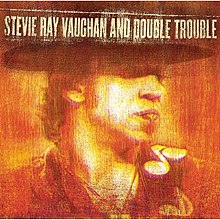Live at Montreux 1982 & 1985
| Live at Montreux 1982 & 1985 | ||||
|---|---|---|---|---|
 | ||||
| Live album by | ||||
| Released | November 20, 2001 | |||
| Recorded | July 17, 1982 and July 15, 1985 | |||
| Venue | Montreux Casino (Montreux, Switzerland) | |||
| Genre | Electric blues, blues rock, jazz | |||
| Length | 118:11 | |||
| Label | Epic | |||
| Producer | Stevie Ray Vaughan | |||
| Stevie Ray Vaughan and Double Trouble chronology | ||||
| ||||
Live at Montreux 1982 & 1985 is the fourth live album of American blues musician Stevie Ray Vaughan and his band Double Trouble, recorded at the Montreux Jazz Festival on July 17, 1982 (Disc 1) and July 15, 1985 (Disc 2), and released November 20, 2001 on Epic Records. Neither are complete concerts.
Track listing
[edit]Disc One – July 17, 1982
- "Hide Away" (Freddie King) – 3:19
- "Rude Mood" (Stevie Ray Vaughan) – 4:54
- "Pride and Joy" (Vaughan) – 4:01
- "Texas Flood" (Larry Davis, Joseph Wade Scott) – 10:27
- "Love Struck Baby" (Vaughan) – 2:53
- "Dirty Pool" (Doyle Bramhall, Vaughan) – 8:17
- "Give Me Back My Wig" (Theodore Taylor) – 3:30
- "Collins Shuffle" (Albert Collins) – 4:51
Disc Two – July 15, 1985
- "Scuttle Buttin'" (Vaughan) – 3:02
- "Say What!" (Vaughan) – 4:45
- "Ain't Gone n' Give Up on Love" (Vaughan) – 6:24
- "Pride and Joy" (Vaughan) – 5:10
- "Mary Had a Little Lamb" (Buddy Guy) – 4:27
- "Tin Pan Alley (aka Roughest Place in Town) (with Johnny Copeland)" (Robert Geddins) – 13:18
- "Voodoo Chile (Slight Return)" (Jimi Hendrix) – 10:51
- "Texas Flood" (Larry Davis, Joseph Wade Scott) – 7:37
- "Life Without You" (Vaughan) – 9:03
- "Gone Home" (Eddie Harris) – 3:53
- "Couldn't Stand the Weather" (Vaughan) – 7:29
Background
[edit]In early 1982, Double Trouble played a show at the Continental Club in Austin, TX. Impressed by the show, legendary producer Jerry Wexler recommended the band play the Montreux Jazz Festival in Switzerland.[1] Booked to play at Montreux International Festival XVI on July 17, 1982, the band's appearance marked the first time that an unsigned act would appear at the prestigious event.[2] Booked on an acoustic night, Double Trouble's performance was met by boos. Vaughan's high volume electric blues was not popular with the European crowd, who preferred a quieter, folk blues style.[2]
However, the first Montreux trip was not a bust. In a last-ditch effort to save the trip, the band's manager, Chelsey Millikin, booked the band to play the casino's after hours bar for two nights running.[2] On the first night, Vaughan was approached by David Bowie, who had seen the Montreux performance, and was interested in having Vaughan play on one of his albums. This would lead to Vaughan's guitar work on Bowie's album, Let's Dance.[1] On the second night, Millikin introduced Vaughan to Jackson Browne, who was impressed by the band's sound. Browne and his band joined Double Trouble on stage, where they jammed until seven the next morning.[2] Browne was so moved by Double Trouble's music that he offered them use of his private recording studio, free of charge.[2] Vaughan and Double Trouble would take Browne up on his offer, and the ensuing recordings would become Texas Flood, which would bring the band into the national spotlight.[1]
Stevie Ray Vaughan and Double Trouble returned to the Montreux Jazz Festival in 1985 as headliners, and were well received by the audience.[3]
DVD release
[edit]A DVD of the Montreux performances was released on September 14, 2004. The DVD version includes the same set-lists as the album, with two extra Johnny Copeland featured songs ("Cold Shot" and "Look at Little Sister") on the 1985 disc. The 1982 disc includes a documentary of the Montreux performances entitled Success in Disguise.[4]
Personnel
[edit]Musicians
[edit]- Stevie Ray Vaughan – guitar and vocals
- Chris Layton – drums
- Tommy Shannon – bass
- Reese Wynans – organ
- Johnny Copeland – guitar and vocals
Production
[edit]- Michael B Borofsky – DVD Producer
- Vic Anesini – Mastering
- Chris Theis – Mixing
- Andy Manganello – Mixing
- Steve Berkowitz – Legacy A&R
- John Jackson – Project Direction
- Patti Matheny – A&R Coordination
- Darren Salmieri – A&R Coordination
- Josh Cheuse – Art Direction
- Angela Skouras – Design
- Breanda McManus – Design Assistance
- Noel Wiggins – Design Assistance
- Darryl Pitt – Cover Photography & Liner Photography
- Don Opperman – Liner Photography
- John Christiana – Packaging Manager
Charts
[edit]| Chart (2001) | Peak position |
|---|---|
| US Billboard 200[5] | 178 |
Notes
[edit]- ^ a b c Gregory, Hugh (2003). Roadhouse blues: Stevie Ray Vaughan and Texas R&B. Hal Leonard. pp. 124–25. ISBN 978-0-87930-747-9.
- ^ a b c d e Patoski, John (1993). Stevie Ray Vaughan: Caught In The Crossfire. Little, Brown and Company. pp. 148–49. ISBN 0-316-16069-5.
- ^ "Montreux DVD Liner Notes". Srvrocks.com. Retrieved May 14, 2021.
- ^ "Stevie Ray Vaughan and Double Trouble – Live at Montreux 1982 & 1985". Amazon.com. 14 September 2004. Retrieved May 14, 2021.
- ^ "Stevie Ray Vaughan Chart History (Billboard 200)". Billboard. Retrieved July 8, 2023.
References
[edit]- Joe Nick Patoski, Bill Crawford (1993). Stevie Ray Vaughan: Caught In The Crossfire. Little, Brown and Company. ISBN 0-316-16069-5.
- Colin Larkin (2002). Virgin Encyclopedia of Popular Music. Edition 4. Virgin Books. ISBN 1-85227-923-0.
External links
[edit]- Music video of Stevie Ray Vaughan's performance of "Tin Pan Alley" at the Montreux Jazz Festival, 1985.
